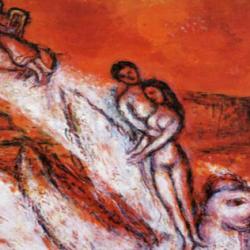Thanks to my friend Alex Trochez for stimulating the following line of thought.
According to Jordan’s count (confirmed by my own), the phrase “shepherding wind” occurs twice in Ecclesiastes by itself (1:17; 4:6) and 7 times with the word “vapor” (1:14; 2:11, 17, 26; 4:4, 16; 6:9). In addition, the NASB has the word “wind” another seven times (1:6 [2x]; 5:16; 8:8 [2x]; 11:4-5). Each of these uses translates the Hebrew RUACH (wind, spirit), and the phrase “shepherding wind” is in Hebrew the breathy pun R’AH RUACH. The NASB translates RUACH as “spirit” three times (7:8 [2x]; 12:7), the last referring to the “spirit” that returns to God, as three times as “breath” (3:19, 21 [2x]). By my count, Solomon uses the word 22x in the whole book.
Throughout the book, Solomon is reflecting on the character of created reality and human life, and there are multiple connections with the early chapters of Genesis. Jordan suggests that the creation issues of lighting, forming, and filling run through the early chapters of Ecclesiastes; Ecclesiastes 2:1-11 is modeled on Yahweh’s construction project in Genesis 2; 1:3-11 talks about the vaporousness manifest in the threefold universe of creation – the earth (1:4: Day 3) that remains forever, the sun (1:5: Day 4), the wind that blows in all directions and circles back (1:6; cf. Genesis 1:2), the network of oceans and rivers (1:7: Day 3), and man toiling on the earth under the sun (1:8). Throughout the book, Solomon reflects on the life of “Adam” and “sons of Adam.”
The repeated references to “wind” or “spirit” also allude back to Genesis 1:2. The vaporous world is formed by the Spirit, and is moved by the Spirit. The reason why the world is wispy and impossible to grasp is because the ultimate ground of reality – the one in whom we live, move, and have our being – is the Spirit who blows where He lists. Human existence is particularly vaporous for the same reason, because we are Spirit-animated dust.















